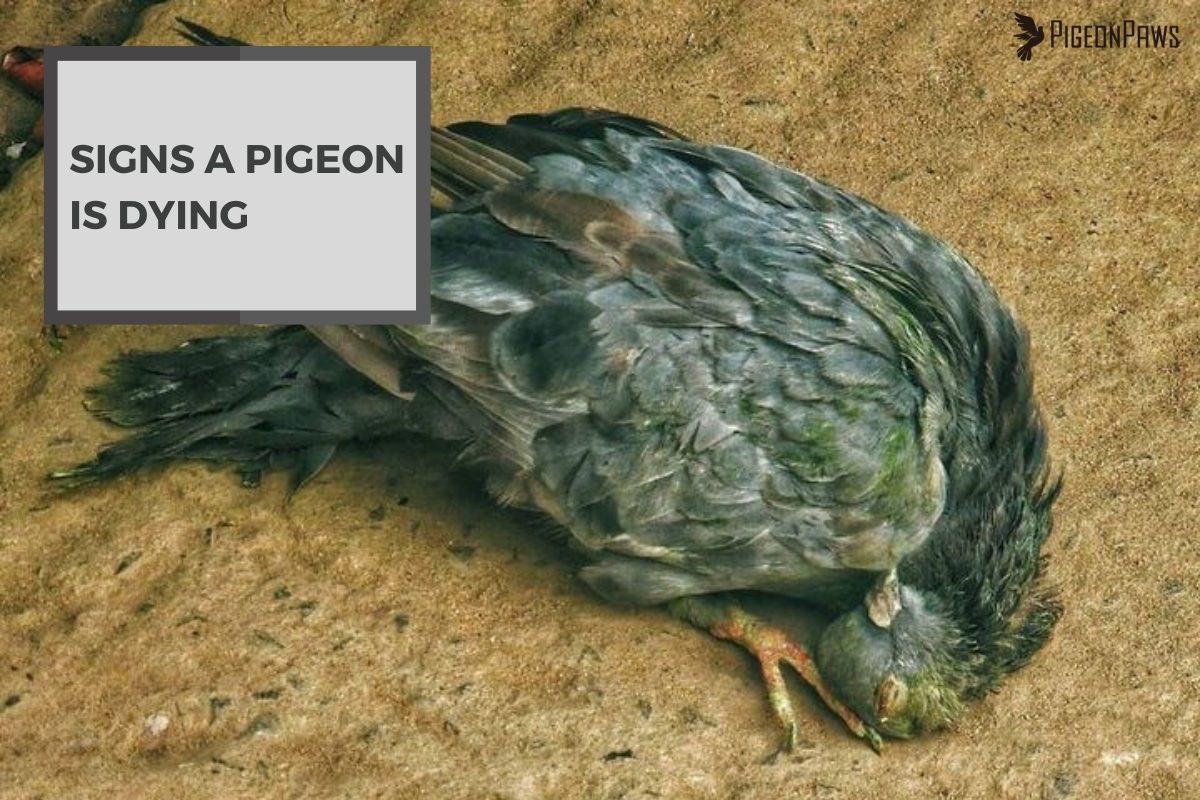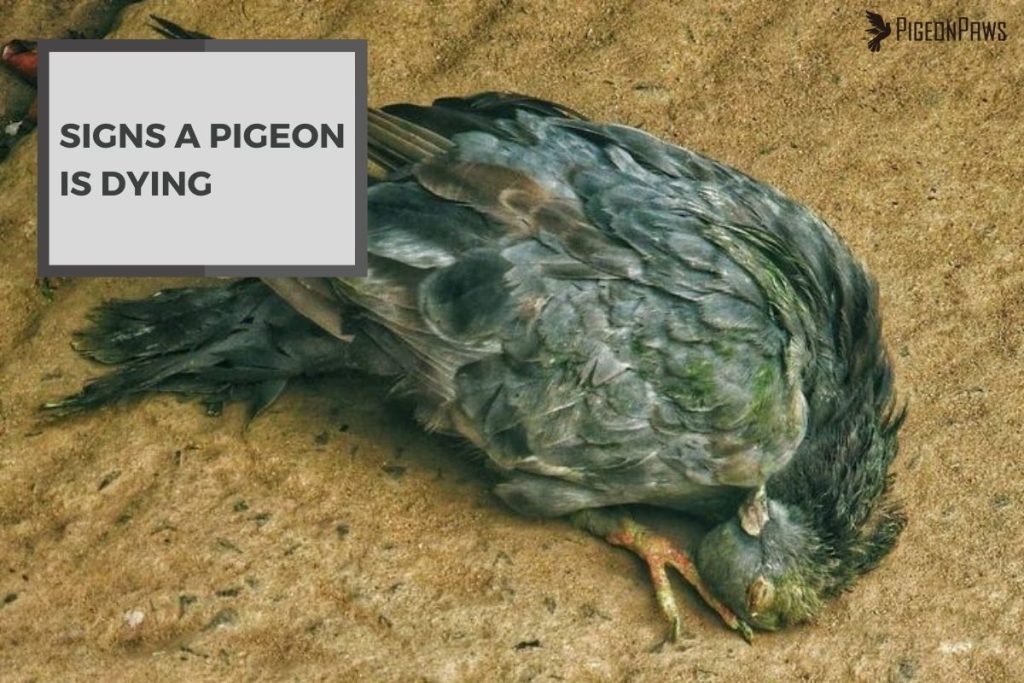Signs a Pigeon Is Dying-Symptoms of Last Days!

If you’re a pigeon lover, the thought of losing one of your feathered friends can be devastating. But, recognizing the signs that a pigeon may be dying can significantly improve its chances of survival.
Signs that a pigeon may be dying include weakness, lethargy, loss of appetite, ruffled feathers, difficulty breathing, and a drooping head or neck. If you notice any of these symptoms, it is essential to seek veterinary care as soon as possible.
Keep reading this article to learn about the various signs of a dying pigeon, the common causes of death, and what actions can be taken to help these birds.

What Are The Common Symptoms Of A Dying Pigeon?
When a pigeon is ill or dying, it may display specific symptoms that indicate it is not healthy. Knowing what to look for can help you determine when medical attention is needed and can help save the bird’s life. Here are the signs of a dying pigeon:
Mobility Issues
Swelling joints, loss of articulation in wings and legs, and swelling feet can all make it difficult for a pigeon to move. This can be accompanied by flaking skin, which is not a good sign.
Solitary Behavior
Sick or dying pigeons often remove themselves from the pack and go to dark-shaded spaces. They may stop interacting with the flock, and you may hear them cooing less and less.
Appetite Changes
Pigeons may stop eating, or their appetite changes and they consume more water. If you notice a change in your pigeon’s eating habits, it’s worth taking a closer look.
Partial Blindness
Pigeons’ eyes are easily damaged by fever or a rise in body temperature. If you notice that your pigeon’s eyes seem cloudy or dull, it may be a sign that they’re not well.
Breathing Difficulties
Pigeons can suffer from breathing issues, and snoring sounds as a disease symptom. If you notice that your pigeon is struggling to breathe, it’s essential to take them to a veterinarian as soon as possible.
Slimy Green Feces
This is a sign that a pigeon is dying. If you notice that your pigeon’s feces are slimy and green, it clearly indicates they’re not well.
Puffiness In Feathers
The feathers become puffy and unkempt. If your pigeon’s feathers are looking ruffled and unkempt, it’s a sign that they’re not well.
Change In Water Consumption
Pigeons consume more water than usual when they are dying. If you notice that your pigeon is drinking more water than usual, it’s a sign that they’re not well.
How Do You Save A Dying Pigeon?
If you come across a dying pigeon, there are certain steps you can take to try and save its life. Here are a few things to keep in mind:
Provide Immediate Care
It’s crucial to provide immediate care to a sick or injured pigeon to try and save its life. This includes isolating the bird from the rest of the flock and keeping it warm.
Coax the Bird to Eat and Drink
Try to coax the bird to eat and drink, but don’t force it, as this can agitate or traumatize the bird.
Check for Obvious Signs of Injury
Check the pigeon for any apparent signs of injury, such as drooping wings, blood, or visible cuts.
Provide Seed or Food
If the pigeon is drinking and seems to be doing okay, you can provide it with seeds or food.
Contact a Veterinarian
In case the pigeon’s health deteriorates, it is crucial to promptly seek assistance from a professional avian veterinarian to receive appropriate medical care.
Isolate the Bird
To maintain the health of the entire flock and minimize the risk of disease transmission, it is crucial to separate the affected bird from the rest of the group. This will also help to minimize stress levels among the flock members.
What Causes Pigeons to Die Suddenly?
Pigeons are susceptible to a number of different diseases and parasites, which can cause them to die suddenly. Some of the more common diseases include:
Salmonella
First, let’s talk about Salmonella. This sneaky little bacteria can lurk in contaminated food or water and, once ingested, can cause severe diarrhea, vomiting, and dehydration. It’s like the stomach flu on steroids.
Paramyxovirus
Next up, we have the ominous-sounding paramyxovirus, also known as PMV. This virus attacks a pigeon’s respiratory system, making breathing difficult for them and often leading to a fatal outcome.
Trichomoniasis
Trichomoniasis is another sneaky parasite that can bring a pigeon down. This infection is transmitted through contaminated water or food and can cause difficulty swallowing, leading to starvation.
Newcastle disease
Last but not least, the Newcastle disease. This highly contagious viral disease can affect a pigeon’s respiratory, nervous, and digestive systems and is often fatal.
What Is the Relationship Between a Pigeon’s Egg-laying Capacity and Its Lifespan?
A recent pigeon egg laying study examined the relationship between egg-laying capacity and lifespan. Researchers found that pigeons with higher egg-laying capacity tended to have shorter lifespans, possibly due to the increased energy expenditure required for the reproductive process. This suggests a trade-off between reproductive output and longevity in pigeons.
Why It’s Important To Pay Attention To These Signs?
Like many other birds, Pigeons tend to hide signs of illness. They do this as a survival mechanism in the wild to avoid attracting predators. As a result, paying attention to even the subtlest changes in behavior or appearance is essential.
By catching these signs early, we can help pigeons get the care they need and potentially save their lives.
Timely identification of illnesses in pigeons is essential for effective treatment. If left untreated, many pigeon diseases can progress rapidly and become fatal. By recognizing early signs of declining health in a pigeon, you can provide prompt medical care, which increases the bird’s chances of survival.
Also, pay attention to the health of pigeons in our communities because they play an essential role in maintaining the balance of nature. These birds are a crucial part of the food chain, and their presence helps keep populations of other species in check.
We can help ensure these important birds continue to thrive in our communities by watching for sick or dying pigeons.
The Dying Moment of Pigeon
Conclusion
It is essential to be aware of the signs of a dying pigeon so that you can act quickly to save its life. Common symptoms of a dying pigeon include weakness, lethargy, lack of appetite, and difficulty breathing.
If you notice any of these signs, taking your pigeon to the vet for an examination as soon as possible is crucial. With proper care and medical attention, you may be able to save the life of your beloved pet.

